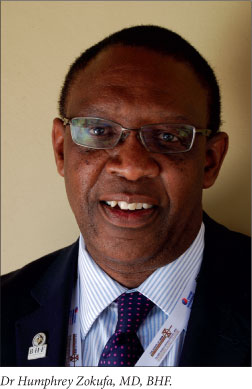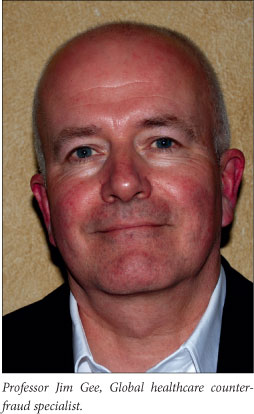Servicios Personalizados
Articulo
Indicadores
Links relacionados
-
 Citado por Google
Citado por Google -
 Similares en Google
Similares en Google
Compartir
SAMJ: South African Medical Journal
versión On-line ISSN 2078-5135
versión impresa ISSN 0256-9574
SAMJ, S. Afr. med. j. vol.102 no.10 Pretoria oct. 2012
IZINDABA
Private healthcare 'lost line in the sand' - Zokufa
South Africa's private healthcare sector had 'gone overboard' commercially, resulting in deep distrust between funders and providers in an opaque environment that had lost sight of the best interests of the patient, Dr Humphrey Zokufa, CEO of the Board of Healthcare Funders (BHF) admitted last month.

He was asked by Izindaba (at the BHF's annual conference at Champagne Castle in the Drakensberg on 1 August) what fundamentally underpinned the acrimonious milieu in which private funders, healthcare managers, hospitals, regulators and healthcare professionals found themselves. Zokufa said that once the legislative framework for taking care of 8.2 million lives was set up, the industry failed to create an environment in which funders and providers saw each other as 'being on the same side of the same coin, all targeting the patient'. He said the basic underlying issues included an absence of trust between funders and providers and a lack of transparency in the system. 'Maybe healthcare has been steered too much to the commercial side of it ... commercialism in health is then run along the lines of how people run a corporate business. I think we've gone overboard. There is a line in the sand that must not be crossed. I don't think we know where that line is . I don't think medical schemes and providers are sensitive to where that line is. It's what drives the lack of trust. Open medical schemes compete with one another, so they don't necessarily play transparently. It's driven by competitive advantage.'
Alluding to prescribed minimum benefits (PMBs) plus the 'free-for-all' on tariffs in the absence of 'consensus' guidelines (August's controversial and short-lived bid by the Health Professions Council of South Africa (HPCSA) to fill the vacuum revealing just how disconnected players are), Zokufa drew an anomaly with companies manufacturing car parts 'but having acrimony' with car makers themselves. 'They come up with a good product for my car. We decide on what is a good price. You survive and I survive. That's not happening in this industry.'
BHF 'caught between a rock and a hard place'
He said that while the BHF might come across as a litigious organisation (an example being their recent appeal to the Supreme Court against PMB pay-outs being made in full), it was caught between a rock and a hard place. On the one hand, up to five years of 'engaging with various parties' had yielded no fruit while on the other 'we're bombarded with various things threatening our viability and sustainability'.
Making a heartfelt appeal to his BHF members in advance of a sorely needed and workable National Health Insurance (NHI), he said the current fragmentation in medical schemes was 'unviable and unsustainable', threatening the 'lives'(read coverage) of all 8.2 million scheme members as solvency ratios inevitably crashed 'going forward'. 'If you can find a way where you as a scheme, with say just 60 000 members, can be part of that bigger NHI picture, then you will have secured your future in that 50 million membership. It's an opportunity to take all the fragmented medical schemes into an environment that will give them huge scale and opportunity,' he said.
He was 'deeply encouraged' by Health Minister Dr Aaron Motsoaledi's request to the BHF to help in setting up the NHI via BHF-members' core healthcare financing skills. The private industry was already a 'template of 92 schemes with administrators and managed care organisations and principal officers that can help set up the NHI process. By securing 'what already exists', government would move into an environment with existing expertise and 'the NHI will find traction on day one', Zokufa suggested.
Asked what his single most important message would be to the private healthcare industry, he responded: 'They cannot sit back and moan about various things and want somebody else to fix it for them. They have to stand up, dirty their hands and roll up their sleeves and deal with the issues currently affecting them - and position themselves to be relevant and in alignment with the emerging issues.'
Health Dept yet to 'think through' NHI fraud prevention
Asked whether anyone in government had yet asked for input/advice from the BHF's seasoned and internationally linked Fraud Health Management Unit (FHMU), Zokufa said his executive wrote to Motsoaledi in early 2010 offering the FHMU's skills but received no acknowledgement. However, in October of that year National Health Director General, Precious Matsotso, met with his team, saying she wanted to establish a private sector 'advice forum', which it recently transpired was due to be set up early next year. 'I think that might be the right timing. Health care fraud in South Africa is tricky.

We have relationships with the police, the Hawks and statutory bodies like the HPCSA, to help them understand the complex issues that investigations involve. We had a strategic meeting with all of them late last year and there will be a training programme. A person trained as an investigator can be easily fooled and many times they don't pursue cases to the nth degree because they hit a brick wall,' he explained.
Alluding to a conference presentation on healthcare fraud given by one of the international doyens of strategic counter-fraud management, Professor Jim Gee, Zokufa said the BHF had begun to work with Gee and other colleagues globally to share cutting-edge practice.
Gee, Chair of the Centre for Counter Fraud Studies at the University of Portsmouth and a private consultant, told delegates that his experience of having worked with many different governments and healthcare companies was that it was vitally important to protect the patient (compared with corporates). Tackling fraud was central to any effective system and to quality patient care. He joked that the UK government approached him as late as 1998 (their NHI having been set up a year or two after World War II). 'The Minister of Health gave me three staff and 21 000 pounds to monitor 1.2 million employees. After two weeks he called me in and asked if I'd caught anybody.'
However, within eight years his much-expanded team had cut the cost of UK healthcare fraud by 60%, saving 811 million pounds and delivering a 12-1 return on the cost of resources spent on countering fraud. In stark contrast, he was recently contracted by the Chinese government (October 2010 when they set up their first NHI). 'They didn't wait 50 years to do something about it. It was very rewarding to see it done right,' said McGee, who emphasised how cost-effective it was to get preventive systems in place 'up front'.
Asked by Izindaba whether he'd been approached by the South African government, given the ongoing endemic and budget-crippling country-wide phenomenon, Gee said no, but was fully prepared to offer his advice and services if asked.1 He told delegates that the greatest fraud cost came from 'high-volume/low-value fraud,' not the other way round. 'That individual doesn't look like costing you a lot of money ... ,' he cautioned.
Some of the most dramatic scams he'd encountered included an Italian, Dr Pier Paola Brega Massone, the head surgeon at Milan's Santa Rita clinic, sentenced to 15 months in jail for conducting/overseeing 80 operations in which healthy body parts were removed without the knowledge of patients to generate payment from Italy's Ministry of Health, and fraudsters generating 60 million Euros by importing counterfeit drugs from Argentina to the UK, France and Denmark, which could have condemned thousands to early deaths. Hospitals were found to have falsely claimed that they had undertaken surgical procedures to attract extra payments (upcoding and unbundling).'The vast majority of people in all vulnerable areas are honest but it's the dishonest minority that do the most significant damage,' he stressed.
A recent statistically validated piece of research of 70 loss analyses in 33 organisations across six countries estimated health fraud losses at just under R13 trillion with the lowest percentage loss anywhere standing at 3%. 'I doubt you beat that (3%) in SA. The average is 7.3% of healthcare spend going astray and the highest just over 15%.' McGee said some 40% of the analyses showed losses of more than 8%.2 Losses due to healthcare fraud globally would provide clean safe water 'everywhere', bring malaria under control in Africa and provide the diphtheria, tetanus and pertussis vaccine to all 23.5 million children under one (2.5 million die each year from vaccine-preventable diseases). The losses were quadruple the budget of the World Health Organization and UNICEF (the United Nations Children's fund), with over R2.57 trillion left over. His organisation promises clients a reduction in fraud of at least 40% within a year.
An ounce of (fraud) prevention ...
Gee offered this piece of advice to healthcare organisations and governments: 'Change the behaviour of your honest majority to decrease the dishonest minority and you reduce the chances of abuse - every penny lost from fraud and corruption drains the lifeblood of your healthcare organisations. The courts and recovery (of funds) are good, but it's much more of a success if fraud didn't occur in the first place'.
While South Africa's public healthcare sector wastage and fraud/corruption losses are almost impossible to properly quantify (judging by KwaZulu-Natal, Limpopo and the Eastern Cape alone, it must be billions), wastage/fraud/corruption estimates for BHF members (excluding Discovery Health), stand at 10 - 12% of their R90 billion spend (contributions). This includes the grey area of systemic wastage (fee for service/over-servicing).
The NHI counter-fraud developments will obviously be worth watching ...
Chris Bateman
chrisb@hmpg.co.za
1. www.pkfapps.co.uk/fraud (for a self-assessment fraud resilience tool) [ Links ]
2. http://www.port.ac.uk/departments/academic/icjs/centreforcounterfraudstudies/ [ Links ]














